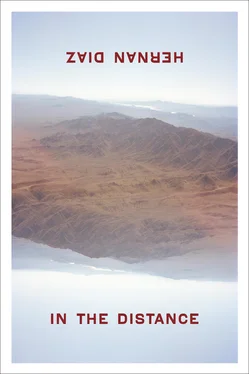Four more people died over the next few days, and each of them was ferried out into the desert at dusk.
The survivors healed. The never-ending lullaby stopped. Even if mangled and mutilated, all of the convalescents were conscious, and if they were in great pain, they were strong enough to conceal it. Among the maimed was the man who had tried to knife Lorimer. From his ankle, that vortex of bone and tendons and flesh, the infection had crept up his calf, and his leg had been amputated at the knee. As soon as he regained some of his vigor, he called Lorimer to his side. With great difficulty and a sour grimace of pain, he sat up. After catching his breath, he delivered a grave speech, brief but heartfelt. When he had finished, he took a leather tote bag and poured out its contents. On his palms were about two dozen teeth, perfectly extracted from the root, some grayed, some yellowed, all dull and gigantic. One of them was as long as the entire palm of his hand.
“Terrible lizards,” said Lorimer with abstracted fascination. “Extinct reptiles. Dragon-like creatures blotted out of existence, vanished from the surface of the earth shortly after the dawn of time.”
Some of the teeth were broken or jagged, but the man made sure to point out that there were a few large ones in perfect condition. He looked at Lorimer and with a solemn word offered him his treasure. Lorimer declined. The man insisted with great vehemence. The scene was repeated a few times until the naturalist understood that rejecting the gift was not only a great offense but also detrimental to his patient’s health—the argument had consumed most of his strength. He took the teeth, and the man lay back down, physically and morally relieved. A woman next to him requested Lorimer’s attention and produced a pouch of her own. She had fewer teeth and only one, displayed with great pride, was unmarred. Once again, Lorimer, who had cured a bullet wound to her abdomen, was asked to accept the treasure. One by one, each of the patients called Lorimer and, with a short ceremonial speech, gave him a handful of dragon teeth. Nobody was as rich (in either quantity or quality) as the first man with the amputated leg. As he made his way down the improvised ward, Lorimer had to start putting the offerings into the bowl of his hat. That heap of ivory shards no longer looked like teeth but rather like some unrecorded mollusk or ammunition for a weapon yet to be invented.
“What better form of currency?” Lorimer thought out loud as they walked back to the wagon. “Because they can’t be manufactured (these long-gone creatures can’t be bred), and because their stock is extremely limited, these teeth will never lose their value. Same principle behind gold or diamonds. But these are so much worthier. And they remind us of how all living beings, quite like goods, are valuable, precisely because they are interchangeable.” He looked through the dagger-like bones. “The perfect standard.”
Life at the camp gradually went back to normal. The wounded were out of danger, and all tents and huts were in good repair. The reverence everyone had shown Lorimer and Håkan dissipated, and eventually the foreigners were simply ignored. The only exception to the general indifference was Antim, the amputee warrior—who had made an extraordinary recovery and become strong enough to ride his horse. He was fanatically devoted to Lorimer and assisted him in every possible way. They spent a great deal of time together, and the naturalist, with his accustomed ease, quickly learned the rudiments of Antim’s language.
Håkan’s days were consumed, for the most part, by his eagerness to set out east. With each day, he felt the distance separating him from Linus increase. Additionally, since he had helped Lorimer with the wounded, he had developed a feeling of urgency entirely new to him. Up to that moment, his longing for his brother was intertwined and often confused with fear—he missed Linus, yes, but he also missed his protection. Now, however, Håkan did not fear for himself, but for his brother. He had the pressing sense that it was Linus who needed him; that he was the one who had to come to his older brother’s rescue (this concern, Håkan realized, had developed together with his medical skills). But Håkan knew the desert well enough to understand that he could not venture out without provisions and animals. He could only hope that his friend would decide to leave soon—and that he would be headed east. Finally, one afternoon, Lorimer told Håkan that it was time to move on.
“I am going back to Saladillo. Antim has offered to help.”
Håkan felt his blood thinning. He breathed in and looked around the plains for something to hold on to. Lorimer put a hand on his shoulder.
“Don’t worry, my dear friend,” he said. “You will be on your way to New York on a horse with all the necessary supplies. Antim, who feels indebted to you as well, will give you one of his ponies, and I will furnish you with all you need for your journey.”
“Please don’t go back to the flats.”
“I must. I know you understand that.”
Håkan could only look down.
“When we left Saladillo, I thought the chance to find the primeval being had been forever lost. How would I ever be able to return to that desolate land? And now Antim tells me that he can take me back there, that he will help me get to the alkali ponds. How can I refuse? I need to find the creature—the only living thing that deserves the name of creature, because it was the only organism ever truly created. The rest of us are only increasingly distorted reproductions of that foundational organism. You understand what such discovery would mean. How can I refuse?”
Håkan was given a pony and one of Lorimer’s burros supplied with necessaries. The naturalist advised him to make a detour before proceeding east. Heading north for about a fortnight, Håkan would eventually come to a river (which would be badly needed by then), and a few days later, a major emigrant trail—even if he strayed off course, it would be impossible to miss that line stretching from coast to coast. Then, all he had to do was travel against the current of settlers, and in a few months’ time, he would reach the Atlantic. Even if his provisions ran out and his animals fell ill, the emigrants would resupply him, and should he run out of money, he could work for a spell (although that would take him west for a while, those caravans were slow) and then resume his journey. The constant flow of pioneers made this the safest route. And, Lorimer added, smiling, the thick stream of emigrants going the opposite way with their wagons and oxen and furniture and horses and goods and women and livestock would even create the illusion that it was the world that moved while Håkan remained in place.
The morning they parted, the naturalist gave his friend some gold, a wad of bills of different denominations, and a polished tin case.
“The tools of your trade,” Lorimer said as Håkan opened the case. It contained vials, bottles, scalpels, needles, suture, clamps, saws, scissors, and other surgical instruments. “Oh, I almost forgot,” Lorimer added while searching his pockets. “You are a hopeless navigator. Do you have other talents? Unquestionably. But never mind telling left from right—I am shocked you know up from down! So here you are,” he said, presenting Håkan with a silver compass. “Blume, my teacher, gave it to me, and now it’s yours.”
Their last moments together were spent over the dial, with Lorimer explaining to his friend how to find north.
On the pony and next to his small burro, Håkan looked like a colossus. His attire increased the eccentricity of his figure. By the time he left the camp, he found it almost impossible to move without ripping his outgrown clothes. As a farewell gift, the women had mended and adjusted his shirt and trousers by keeping the original fabric and structure of the garments and grafting in additional material—offcuts from their tents, snippets from old quilts, patches they had woven whenever the scraps were too small. The result was a somewhat shapeless but cool and comfortable outfit whose provenance was impossible to determine—the European peasant, the Californian trapper, and the itinerant Indian had come together on an equal footing. The short-haired man, who turned out to be a consummate cobbler, repaired his cut-up shoes by stitching on two inches of leather to the soles and replacing most of the upper parts with the softest buckskin, which resulted in an odd sort of heeled moccasin. Finally, the children had decorated his felt hat with a colorful ribbon holding an iridescent black feather.
Читать дальше












